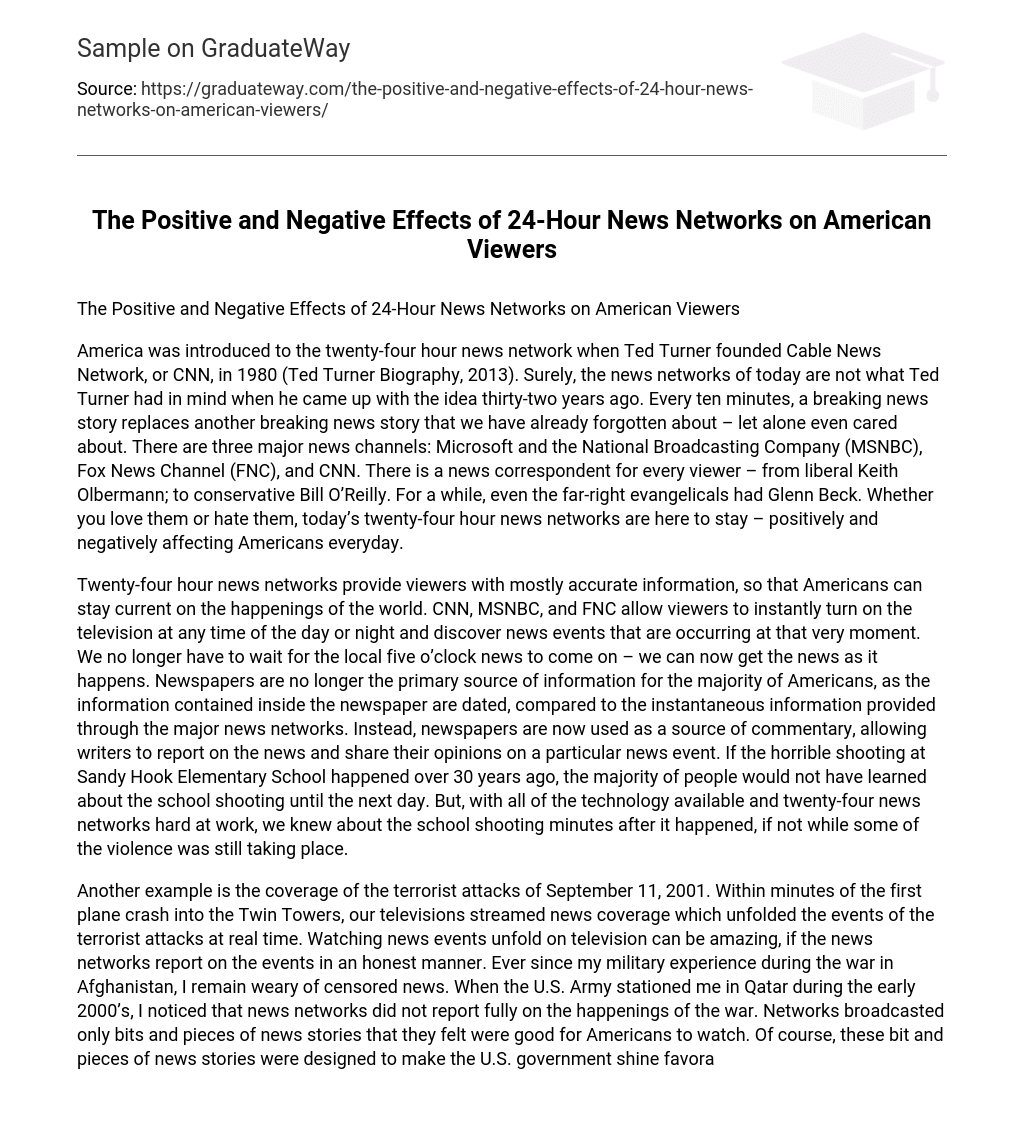When CNN was established by Ted Turner in 1980, it introduced the concept of a twenty-four hour news network to America (Ted Turner Biography, 2013). However, the current news networks are not what Turner initially envisioned over thirty years ago. Nowadays, breaking news stories rapidly replace each other every ten minutes, often leading us to forget or dismiss the previous one. The major news channels include MSNBC (Microsoft and the National Broadcasting Company), FNC (Fox News Channel), and CNN. Each channel caters to a different audience; liberal viewers who follow Keith Olbermann, conservative viewers who tune in for Bill O’Reilly, and even far-right evangelicals had their own correspondent with Glenn Beck for a period of time. Regardless of personal opinions, today’s twenty-four hour news networks have become a permanent fixture in American society and have both positive and negative impacts on daily life.
24-hour news networks, such as CNN, MSNBC, and FNC, play a crucial role in providing up-to-the-minute information to keep Americans well-informed about global events. These networks enable viewers to instantly access the latest news at any time, eliminating the need to wait for local news broadcasts. With newspapers lagging behind in reporting compared to the immediate updates offered by major news networks, most Americans now rely less on newspapers as their primary source of information. Nowadays, newspapers primarily serve as platforms for commentary and opinion regarding news events. In earlier times, tragic incidents like the Sandy Hook Elementary School shooting would have taken much longer to become public knowledge. However, thanks to technology and the efforts of 24-hour news networks, we were made aware of the shooting within minutes—or possibly even while it was still ongoing.
One example illustrating this point is the coverage of the September 11, 2001 terrorist attacks. The events were televised in real time, beginning with the initial plane crashing into the Twin Towers. Witnessing such news unfold on television can be awe-inspiring, as long as it is reported honestly by news networks.
However, my experience serving in the military during the Afghanistan war has made me cautious about censored news. While stationed in Qatar with the U.S. Army in the early 2000s, I observed that news networks withheld full reports on war developments. Instead, they selectively broadcasted fragments of stories deemed suitable for American viewers and intended to present a favorable image of the U.S. government.
Besides offering viewers immediate access to the latest news, twenty-four hour news networks also have several drawbacks. The primary concern with these networks is the decline in journalism integrity. In an effort to be the first to report breaking news, writers and reporters occasionally neglect the fact-checking process, resulting in compromised accuracy. Fueled by the urgency, reporters often rush to conclusions and share their speculations with viewers instead of waiting for unfolding facts. As they prioritize being first, networks prioritize sensationalism over the potential harm caused by misleading information. Each 24-hour news network has a group of anchors who appear to pursue a clear political agenda. Pundits are given an overwhelming amount of airtime to present their opinions as news. Guests are invited onto news programs solely for confrontational purposes, with hosts berating them for holding differing views. Furthermore, news anchors make outlandish statements during broadcasts, which are then repeatedly played throughout the day on the network.
CNN’s use of the Multi-Touch Collaboration Wall and hologram technology is seen by some as a way to put on a show for their viewers, despite the high cost. One example that stands out is when the rapper Will-I-Am was “beamed” into the CNN studios as a hologram to share his excitement about Election Day in 2008. However, the over-reliance on technology and the biased arguments presented by news anchors from other major networks serve as distractions from the primary goal of keeping people informed through unbiased daily news reports.
However, the 24-hour news networks are not solely responsible for the negative aspects of their organizations. The United States as a whole has a short attention span and always craves the next big story to keep viewers engaged. While some news stories chosen are important, most often they focus on topics that are a significant waste of time. According to Antiwar.com, the Iraq War has endured for ten years and incurred a cost exceeding six trillion dollars. It has resulted in nearly 4,500 soldier deaths and over 32,000 soldiers injured in action (Casualties in Iraq, 2013). Additionally, there are numerous reports on individuals dying due to lack of health insurance which unfortunately receive minimal airtime on major news networks. However, if it involves a celebrity death or Hollywood break-up, we disgracefully witness non-stop coverage of such news for an entire week. I aspire for genuine journalists who report factual information on meaningful news topics without shouting or expressing personal opinions about the story to once again grace our television screens.





